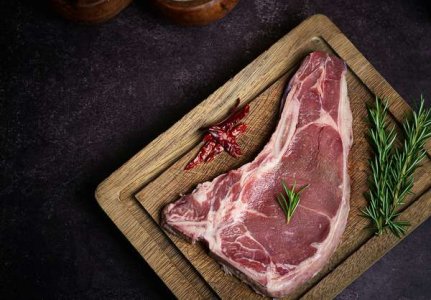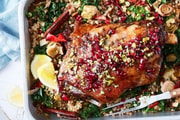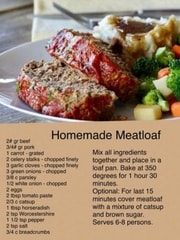Aussie farmers push for changing the way we see red meat
By
Danielle F.
- Replies 12
When strolling through the meat aisle at your local supermarket, you might think there isn’t much about the red meat you're buying.
However, the labels on your favourite cuts of meat may not tell the whole story.
A growing movement among farmers may lead to a significant shift in how you shop, and potentially impact your wallet.
The issue lies in the Meat Standards Australia (MSA) quality index, a system developed by the farming industry based on extensive consumer taste tests.
While the MSA index has been instrumental in improving the quality of red meat, it focuses on factors such as sex, weight, and marbling, but not on the food it consumed as cattle.
Some point out this is a critical omission for many consumers, especially for those concerned about the food's origins and ethical implications.
The Australian Competition and Consumer Commission (ACCC) currently does not require claims like 'organic certification' to be included for a product to be sold as such in Australia.
This means that consumers may not be getting the full picture of what they're buying, and that's something that farmers like Bianca Tarrant, a New South Wales farmer and co-founder of organic food delivery service Our Cow, want to change.
Tarrant advocates for a grading system for red meat that mirrors the one used for eggs.
This system would provide clear information on whether the meat comes from grass-fed or grain-fed animals, if it's organic, or if it's hormone-free.
'I think it's about giving consumers the knowledge so they can make an educated decision on the produce that they are buying,' she explained.
The proposed changes will reflect real production costs and empower consumers to make informed decisions
Grass-fed cattle, for example, require exceptional pastures and are more labour-intensive to raise.
They also need to be located in specific geographic areas that support such farming practices.
'It's very similar to eggs, the price will be reflective in the way that the animal is raised,' she said.
'And it's just about giving consumers the information that they need to make that decision.’
‘Not everybody can afford to choose to have organic or free-range eggs in the same way not everybody can afford grass-fed and organic meat products. It's not about eating more meat but eating better quality meat,' she added.
This push for change is not without precedent.
The egg industry experienced a significant transformation with their labelling. According to research group Australian Eggs, consumers can now distinguish produce between free-range, cage-free, and caged eggs.
Tarrant believes it's time for the meat industry to follow suit, so consumers can make choices that align with their values and dietary preferences.

Do you think a more detailed grading system would influence your purchasing decisions? Join the conversation by sharing your opinions in the comments below.
However, the labels on your favourite cuts of meat may not tell the whole story.
A growing movement among farmers may lead to a significant shift in how you shop, and potentially impact your wallet.
The issue lies in the Meat Standards Australia (MSA) quality index, a system developed by the farming industry based on extensive consumer taste tests.
While the MSA index has been instrumental in improving the quality of red meat, it focuses on factors such as sex, weight, and marbling, but not on the food it consumed as cattle.
Some point out this is a critical omission for many consumers, especially for those concerned about the food's origins and ethical implications.
The Australian Competition and Consumer Commission (ACCC) currently does not require claims like 'organic certification' to be included for a product to be sold as such in Australia.
This means that consumers may not be getting the full picture of what they're buying, and that's something that farmers like Bianca Tarrant, a New South Wales farmer and co-founder of organic food delivery service Our Cow, want to change.
Tarrant advocates for a grading system for red meat that mirrors the one used for eggs.
This system would provide clear information on whether the meat comes from grass-fed or grain-fed animals, if it's organic, or if it's hormone-free.
'I think it's about giving consumers the knowledge so they can make an educated decision on the produce that they are buying,' she explained.
The proposed changes will reflect real production costs and empower consumers to make informed decisions
Grass-fed cattle, for example, require exceptional pastures and are more labour-intensive to raise.
They also need to be located in specific geographic areas that support such farming practices.
'It's very similar to eggs, the price will be reflective in the way that the animal is raised,' she said.
'And it's just about giving consumers the information that they need to make that decision.’
‘Not everybody can afford to choose to have organic or free-range eggs in the same way not everybody can afford grass-fed and organic meat products. It's not about eating more meat but eating better quality meat,' she added.
This push for change is not without precedent.
The egg industry experienced a significant transformation with their labelling. According to research group Australian Eggs, consumers can now distinguish produce between free-range, cage-free, and caged eggs.
Tarrant believes it's time for the meat industry to follow suit, so consumers can make choices that align with their values and dietary preferences.
Key Takeaways
- Aussie farmers are advocating for a new labelling system for red meat products that would provide more detailed information regarding how the animals were raised, similar to egg labelling.
- The proposed labels would indicate whether the meat is from animals that are grass-fed, grain-fed, organic, or hormone-free, letting consumers make more informed purchasing decisions.
- Meat Standards Australia’s quality index currently informs consumers about the eating quality of red meat based on tests but does not account for factors like animal feed or farming practices.
- Implementing this labelling can lead to higher meat prices, reflecting the farming methods used.
- Proponents argue it will enable consumers to choose better quality meat according to their budget and preferences.









